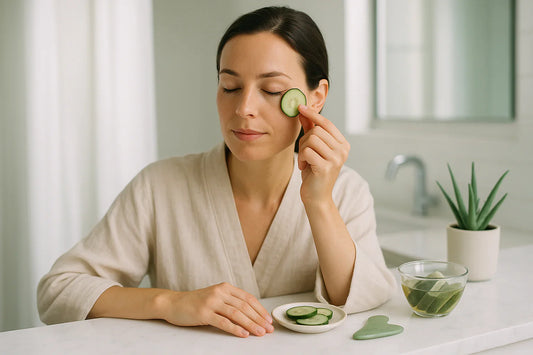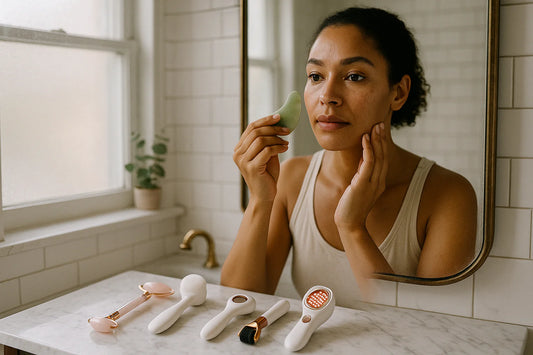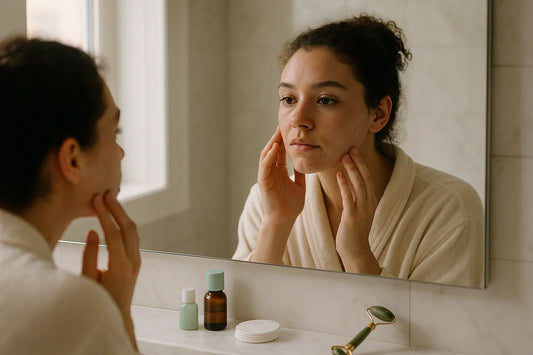Get your package anywhere!

When Should You Ice Roll Your Face? Best Times & Benefits
Did you know that ice rolling can reduce facial puffiness by up to 40% in just 5 minutes? This ancient beauty practice, now backed by modern science, has become a cornerstone of effective skincare routines worldwide. But timing is everything when it comes to maximizing the benefits of cold therapy for your face. Whether you're looking to depuff morning eyes, soothe post-workout skin, or prep for a special event, understanding when to ice roll can transform your skincare results and give you that coveted healthy glow.
Table of Contents
- Understanding Ice Rolling: The Science Behind Cold Therapy for Your Skin
- Morning Ice Rolling: Starting Your Day with a Refreshing Glow
- Evening Ice Rolling: Unwinding with Soothing Skin Care
- Post-Workout Recovery: When Should You Ice Roll Your Face After Exercise
- Pre-Event Preparation: Strategic Timing for Special Occasions
- Seasonal Considerations: Adapting Your Ice Rolling Schedule
- Signs Your Skin Needs Ice Rolling: Reading Your Body's Signals
- Frequency and Duration: How Often Should You Ice Roll
- Combining Ice Rolling with Your Skincare Routine: Perfect Timing
- Common Mistakes: When Not to Ice Roll Your Face
- Maximizing Benefits: Creating Your Personal Ice Rolling Schedule
- Myths & Facts About Ice Rolling Timing
- FAQ
Understanding Ice Rolling: The Science Behind Cold Therapy for Your Skin
Ice rolling harnesses the power of cryotherapy to deliver immediate and long-term benefits to your facial skin. When cold temperatures are applied to the skin, several physiological responses occur that contribute to improved appearance and health.
The science behind cold therapy includes:
- Vasoconstriction: Blood vessels temporarily narrow, reducing inflammation and puffiness
- Lymphatic drainage: Cold stimulates lymph flow, helping eliminate toxins and excess fluid
- Collagen stimulation: Temperature shock encourages collagen production for firmer skin
- Pore tightening: Cold causes temporary pore constriction for smoother appearance
- Endorphin release: Cold therapy triggers natural mood-boosting chemicals
According to Healthline, the benefits of facial ice therapy are most pronounced when applied at optimal times and temperatures. The key is understanding when your skin will respond best to this treatment.
"The timing of ice rolling can dramatically impact its effectiveness. Your skin's natural rhythms and daily stressors create windows of opportunity where cold therapy delivers maximum benefits."
Morning Ice Rolling: Starting Your Day with a Refreshing Glow
Morning ice rolling is perhaps the most popular and effective time to incorporate this practice into your routine. Your skin naturally accumulates fluid overnight, making morning the perfect time to address puffiness and kickstart circulation.
Benefits of morning ice rolling:
- Reduces overnight puffiness: Especially effective for under-eye bags and facial swelling
- Boosts circulation: Increases blood flow for a natural, healthy glow
- Tightens skin: Creates a smooth canvas for makeup application
- Energizes and awakens: Cold therapy provides an instant energy boost
- Enhances product absorption: Prepares skin to better receive morning skincare products
Optimal morning timing:
- Immediately after waking: When puffiness is most pronounced
- Before skincare routine: 5-10 minutes before applying serums and moisturizers
- Pre-makeup application: 15-20 minutes before makeup for best results
| Time After Waking | Best For | Duration |
|---|---|---|
| 0-5 minutes | Maximum depuffing | 3-5 minutes |
| 10-15 minutes | Pre-skincare prep | 2-3 minutes |
| 20-30 minutes | Makeup preparation | 1-2 minutes |
Evening Ice Rolling: Unwinding with Soothing Skin Care
Evening ice rolling serves a different purpose than morning treatments, focusing on calming inflammation, reducing redness, and preparing your skin for overnight repair processes.
Evening benefits include:
- Soothes daily irritation: Calms skin stressed by environmental factors
- Reduces inflammation: Helps heal minor breakouts and irritation
- Enhances product penetration: Prepares skin for nighttime treatments
- Promotes relaxation: Cold therapy can help reduce stress and tension
- Minimizes enlarged pores: Temporarily tightens pores after cleansing
Best evening timing:
- After cleansing: When skin is clean but before applying treatments
- Before serums: To enhance absorption of active ingredients
- Post-exfoliation: To calm skin after chemical or physical exfoliation
- Before bed: As a relaxing end to your skincare routine
"I started ice rolling every evening after cleansing, and my skin looks so much calmer and more refined. It's become my favorite way to unwind after a long day."
— Maria L., HighWand Customer
Post-Workout Recovery: When Should You Ice Roll Your Face After Exercise
Post-workout ice rolling is crucial for managing exercise-induced inflammation and heat. The timing after your workout can significantly impact the effectiveness of this treatment.
Why post-workout ice rolling works:
- Reduces exercise flush: Calms redness and heat from increased circulation
- Prevents breakouts: Closes pores that may be enlarged from sweating
- Soothes irritation: Reduces friction-related irritation from towels or equipment
- Accelerates recovery: Helps skin return to baseline temperature faster
Optimal post-workout timing:
- Immediately after: Within 5-10 minutes for maximum cooling effect
- After initial cooldown: Once your core body temperature begins normalizing
- Before showering: To close pores and prepare for cleansing
- Duration: 2-3 minutes of gentle rolling motions
Pre-Event Preparation: Strategic Timing for Special Occasions
Strategic ice rolling before important events can help you achieve your best possible appearance. The key is timing the treatment to maximize benefits while allowing any temporary redness to subside.
Pre-event benefits:
- Instant depuffing: Reduces any morning or stress-related swelling
- Skin tightening: Creates a firmer, more lifted appearance
- Pore minimization: Temporarily reduces pore visibility
- Enhanced glow: Boosts circulation for natural radiance
- Makeup longevity: Creates better base for long-lasting makeup
Event timing strategy:
- 30-45 minutes before: Allows time for any redness to fade
- After skincare, before makeup: Optimal preparation sequence
- Gentle technique: Avoid aggressive rolling that might cause irritation
- Focus areas: Concentrate on under-eyes, cheeks, and jawline
Seasonal Considerations: Adapting Your Ice Rolling Schedule
Seasonal changes affect your skin's needs and response to cold therapy. Adapting your ice rolling schedule to match seasonal skin concerns optimizes results year-round.
Spring ice rolling:
- Combat allergy puffiness: Morning sessions to reduce seasonal swelling
- Transition skin care: Help skin adjust to changing weather
- Frequency: Daily morning sessions during peak allergy season
Summer considerations:
- Heat relief: Multiple daily sessions during hot weather
- Post-sun exposure: Evening treatments to calm sun-stressed skin
- Pre-outdoor activities: Morning prep for heat protection
Fall and winter adjustments:
- Reduced frequency: Less frequent sessions in cold weather
- Shorter duration: 1-2 minutes instead of 3-5 minutes
- Focus on circulation: Combat winter dullness with targeted rolling
Signs Your Skin Needs Ice Rolling: Reading Your Body's Signals
Learning to recognize when your skin would benefit most from ice rolling helps you use this tool more effectively and avoid unnecessary treatments.
Visual signs that indicate ice rolling would help:
- Morning puffiness: Especially around eyes and cheeks
- Enlarged pores: Particularly after cleansing or steaming
- Redness or inflammation: From breakouts, irritation, or sensitivity
- Dull complexion: Lack of natural glow or circulation
- Skin tightness: After treatments or environmental exposure
Physical sensations that suggest ice rolling:
- Facial tension: Stress-related muscle tightness
- Heat or flushing: From exercise, spicy food, or hormones
- Itchiness: From allergies or mild irritation
- Fatigue appearance: When you look tired despite adequate sleep
"Your skin's appearance in the morning is often the best indicator of whether ice rolling will be beneficial that day. Trust your visual assessment and skin's feedback."
Frequency and Duration: How Often Should You Ice Roll
The frequency and duration of ice rolling sessions depend on your skin type, concerns, and goals. Understanding these parameters prevents overuse while maximizing benefits.
General frequency guidelines:
- Daily use: Safe for most skin types when done gently
- Twice daily: Morning and evening for maximum benefits
- As needed: Responsive use based on skin condition
- Special occasions: Additional sessions before important events
Duration recommendations:
- Sensitive skin: 1-2 minutes maximum
- Normal skin: 3-5 minutes per session
- Oily/thick skin: Up to 5-7 minutes if well-tolerated
- Problem areas: Focus 30-60 seconds per specific concern
| Skin Type | Frequency | Duration |
|---|---|---|
| Sensitive | 3-4 times/week | 1-2 minutes |
| Normal | Daily | 3-5 minutes |
| Oily/Acne-prone | Twice daily | 3-5 minutes |
Combining Ice Rolling with Your Skincare Routine: Perfect Timing
Integrating ice rolling seamlessly into your existing skincare routine requires understanding the optimal sequence and timing with other products and treatments.
Morning routine integration:
- Step 1: Gentle cleansing with lukewarm water
- Step 2: Ice rolling for 3-5 minutes
- Step 3: Wait 2-3 minutes for skin to normalize
- Step 4: Apply vitamin C serum or morning treatments
- Step 5: Moisturizer and SPF
Evening routine sequence:
- Step 1: Double cleanse to remove makeup and impurities
- Step 2: Ice rolling for 2-3 minutes
- Step 3: Apply treatment serums (retinol, acids)
- Step 4: Night moisturizer or facial oil
For enhanced results, consider combining ice rolling with advanced treatments like HighWand Youth™, which can complement the circulation-boosting effects of cold therapy.
"I ice roll right after cleansing and before my serums. My products seem to absorb so much better, and my skin looks plumper and more radiant all day."
— Jennifer K., HighWand Customer
Common Mistakes: When Not to Ice Roll Your Face
Understanding when to avoid ice rolling is just as important as knowing when to use it. Certain conditions and circumstances make ice rolling counterproductive or potentially harmful.
Avoid ice rolling when:
- Skin is broken: Open wounds, cuts, or active cold sores
- Severe rosacea flare: During active inflammatory episodes
- Immediately after procedures: Chemical peels, microneedling, or laser treatments
- Extreme cold sensitivity: Conditions like Raynaud's disease
- Active eczema: During flare-ups of inflammatory skin conditions
Timing mistakes to avoid:
- Right before bed: Can be too stimulating for sleep
- Immediately after hot treatments: Extreme temperature changes can shock skin
- During illness: When immune system is compromised
- Over-frequency: More than twice daily can cause irritation
According to Vogue, the key to successful ice rolling is moderation and paying attention to your skin's response.
Maximizing Benefits: Creating Your Personal Ice Rolling Schedule
Creating a personalized ice rolling schedule based on your lifestyle, skin type, and goals ensures you get the maximum benefit from this powerful treatment.
Factors to consider for your schedule:
- Skin type and sensitivity: Determines frequency and duration
- Primary concerns: Puffiness, inflammation, or circulation issues
- Daily routine: Available time and existing skincare steps
- Seasonal needs: Adjustments for weather and environmental factors
- Special events: Planning for optimal appearance timing
Sample weekly schedule for normal skin:
- Monday-Friday: Morning ice rolling (5 minutes) + evening as needed
- Saturday: Extended morning session (7 minutes) + pre-event touch-up
- Sunday: Gentle evening session (3 minutes) for weekly reset
Tracking your results:
- Photo documentation: Weekly progress photos in consistent lighting
- Skin response notes: How your skin feels and looks after sessions
- Timing adjustments: What works best for your schedule and results
- Product compatibility: How ice rolling affects other treatments
Myths & Facts About Ice Rolling Timing
-
Myth: Ice rolling should only be done in the morning.
Fact: Evening ice rolling offers different but equally valuable benefits for calming and preparation. -
Myth: You can ice roll immediately after any skincare treatment.
Fact: Wait at least 24 hours after chemical peels or aggressive treatments before ice rolling. -
Myth: The longer you ice roll, the better the results.
Fact: Optimal sessions last 3-5 minutes; longer can cause skin damage or numbness. -
Myth: Ice rolling works the same regardless of timing.
Fact: Your skin's circadian rhythms and daily stressors create optimal windows for treatment.
FAQ
What's the best time of day to ice roll your face?
Morning is typically most effective for reducing overnight puffiness and preparing skin for the day. However, evening sessions offer calming benefits and can enhance nighttime skincare absorption.
How long should you wait between ice rolling and applying skincare products?
Wait 2-3 minutes after ice rolling before applying serums or treatments. This allows your skin temperature to normalize while maintaining the circulation benefits.
Can you ice roll your face twice a day?
Yes, twice daily is safe for most skin types when done gently. Morning sessions focus on depuffing, while evening sessions calm and soothe.
Should you ice roll before or after working out?
Ice rolling is most beneficial after workouts to reduce heat, close pores, and calm exercise-induced inflammation. Pre-workout ice rolling isn't typically necessary.
How do you know if you're ice rolling too frequently?
Signs of overuse include persistent redness, increased sensitivity, broken capillaries, or skin that feels constantly tight. Reduce frequency if these symptoms occur.
Mastering the timing of ice rolling transforms this simple tool into a powerful skincare ally. Whether you're targeting morning puffiness, post-workout inflammation, or preparing for special events, understanding when and how to use cold therapy maximizes its benefits. Start with gentle morning sessions and adjust based on your skin's response and lifestyle needs. Remember, consistency and proper timing matter more than intensity when it comes to achieving lasting results with ice rolling.

More skincare tips
View all-

Natural Remedies to Minimize Puffiness Around t...
Over 70% of adults deal with eye puffiness, often making them look tired even after a full night’s sleep. Whether from allergies, habits, or genetics, natural remedies like cold therapy,...
Natural Remedies to Minimize Puffiness Around t...
Over 70% of adults deal with eye puffiness, often making them look tired even after a full night’s sleep. Whether from allergies, habits, or genetics, natural remedies like cold therapy,...
-

Choosing the Right Skincare Tool for Your Skin ...
Skincare tools in 2025 can be overwhelming—and 73% of beauty lovers admit they’re confused about what really works. The wrong pick can waste money and irritate skin, while the right...
Choosing the Right Skincare Tool for Your Skin ...
Skincare tools in 2025 can be overwhelming—and 73% of beauty lovers admit they’re confused about what really works. The wrong pick can waste money and irritate skin, while the right...
-

Why Does One Side of My Face Have More Acne? 7 ...
Asymmetrical acne—when one side of your face breaks out more than the other—affects most acne-prone people. Hidden triggers like sleep position, phone use, or hair products often fuel the imbalance....
Why Does One Side of My Face Have More Acne? 7 ...
Asymmetrical acne—when one side of your face breaks out more than the other—affects most acne-prone people. Hidden triggers like sleep position, phone use, or hair products often fuel the imbalance....
Satisfied or refunded
Free returns within 60 days
We are available 24/7
Contact us by chat, mail, phone
100% Secure payments
Visa, Mastercard, Amex, PayPal
We deliver worldwide
Get your package anywhere!
Satisfied or refunded
Free returns within 60 days
We are available 24/7
Contact us by chat, mail, phone
100% Secure payments
Visa, Mastercard, Amex, PayPal
- Choosing a selection results in a full page refresh.
- Opens in a new window.



